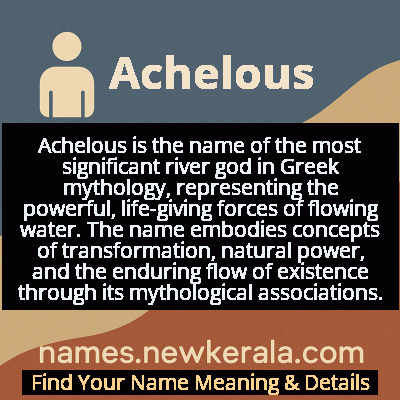Achelous Name Meaning & Details
Origin, Popularity, Numerology Analysis & Name Meaning of Achelous
Discover the origin, meaning, and cultural significance of the name ACHELOUS. Delve into its historical roots and explore the lasting impact it has had on communities and traditions.
Name
Achelous
Gender
Male
Origin
Greek
Lucky Number
3
Meaning of the Name - Achelous
Achelous is the name of the most significant river god in Greek mythology, representing the powerful, life-giving forces of flowing water. The name embodies concepts of transformation, natural power, and the enduring flow of existence through its mythological associations.
Achelous - Complete Numerology Analysis
Your Numerology Number
Based on Pythagorean Numerology System
Ruling Planet
Jupiter
Positive Nature
Optimistic, inspirational, and creative.
Negative Traits
Scattered, exaggerating.
Lucky Colours
Yellow, gold, purple.
Lucky Days
Thursday.
Lucky Stones
Yellow sapphire.
Harmony Numbers
1, 2, 9.
Best Suited Professions
Arts, writing, communication.
What People Like About You
Creativity, optimism.
Famous People Named Achelous
Achelous (Mythological)
River God
Divine personification of Greece's largest river and shape-shifting deity
Achelous (Literary Figure)
Mythological Character
Prominent figure in Homeric epics and classical Greek literature
Achelous (Artistic Subject)
Mythological Icon
Frequently represented in ancient Greek art and sculpture
Name Variations & International Equivalents
Click on blue names to explore their detailed meanings. Gray names with will be available soon.
Cultural & Historical Significance
The mythological narratives surrounding Achelous, particularly his famous shape-shifting battle with Heracles, serve as powerful allegories for humanity's relationship with nature. This struggle symbolizes the tension between civilization's desire to control natural forces and nature's inherent wildness and resistance to domination. Achelous's ability to transform into different creatures underscores the fluid, unpredictable character of rivers and natural phenomena. His role as 'father of rivers' and his numerous offspring with various nymphs further emphasizes his generative, life-giving aspects, making him a complex symbol of both creative and destructive natural powers in Greek cultural consciousness.
Extended Personality Analysis
Individuals named Achelous are often perceived as possessing the fluid adaptability and persistent strength characteristic of flowing water. They may demonstrate remarkable resilience in facing obstacles, much like a river that finds alternative paths around barriers while maintaining its essential direction. The mythological associations suggest a personality capable of profound transformation and versatility, able to adapt to different situations while retaining core identity. Like the river god who could shift between human, serpent, and bull forms, those bearing this name might exhibit multifaceted talents and the ability to present different aspects of themselves as circumstances require.
The dual nature of rivers—both nurturing and dangerous—may manifest as a personality with deep emotional currents that can be both supportive and overwhelming. There's likely a strong connection to nature and natural cycles, with an intuitive understanding of flow and timing. The competitive aspect shown in Achelous's battle with Heracles suggests potential traits of determination and willingness to engage in challenges, though perhaps with a tendency toward stubbornness when principles are at stake. The enduring quality of rivers points to personality characteristics of patience, long-term vision, and the understanding that significant change often occurs gradually through consistent effort rather than sudden transformation.
Modern Usage & Popularity
In contemporary naming practices, Achelous remains an exceptionally rare choice, primarily selected by parents with strong classical education or particular interest in Greek mythology. The name's complexity and strong mythological associations make it more appealing to academic families, classicists, or those seeking distinctive names with deep cultural roots rather than following popular trends. It occasionally appears in literary contexts or among communities that value historical and mythological names, but it has never achieved mainstream popularity. The name's length and unusual sound pattern may deter some modern parents, though it serves as a powerful statement name for those embracing its rich heritage and natural symbolism in an era increasingly concerned with environmental consciousness and connection to ancient wisdom.
Symbolic & Spiritual Meanings
Achelous symbolizes the eternal flow of existence, representing both the constancy of change and the persistence of essential identity through transformation. As a river deity, he embodies the journey of life itself—always moving forward, adapting to landscapes, carving new paths while maintaining directional purpose. His mythological shape-shifting capabilities serve as powerful metaphors for personal evolution and the many forms one assumes throughout different life stages. The river's dual nature as both life-giver and potential destroyer reflects the balance of creative and destructive forces inherent in all natural processes and human experience.
The symbolic meaning extends to concepts of purification and renewal, as rivers have traditionally represented cleansing and rebirth across cultures. Achelous's struggle with Heracles symbolizes humanity's ongoing negotiation with natural forces—the attempt to harness power while respecting its autonomy. The river god also represents the interconnectedness of all things, as rivers connect diverse landscapes and communities, much as individuals bearing this name might serve as connectors between different people, ideas, or environments. His enduring presence in mythology underscores the timeless human recognition of water as fundamental to existence and transformation.

